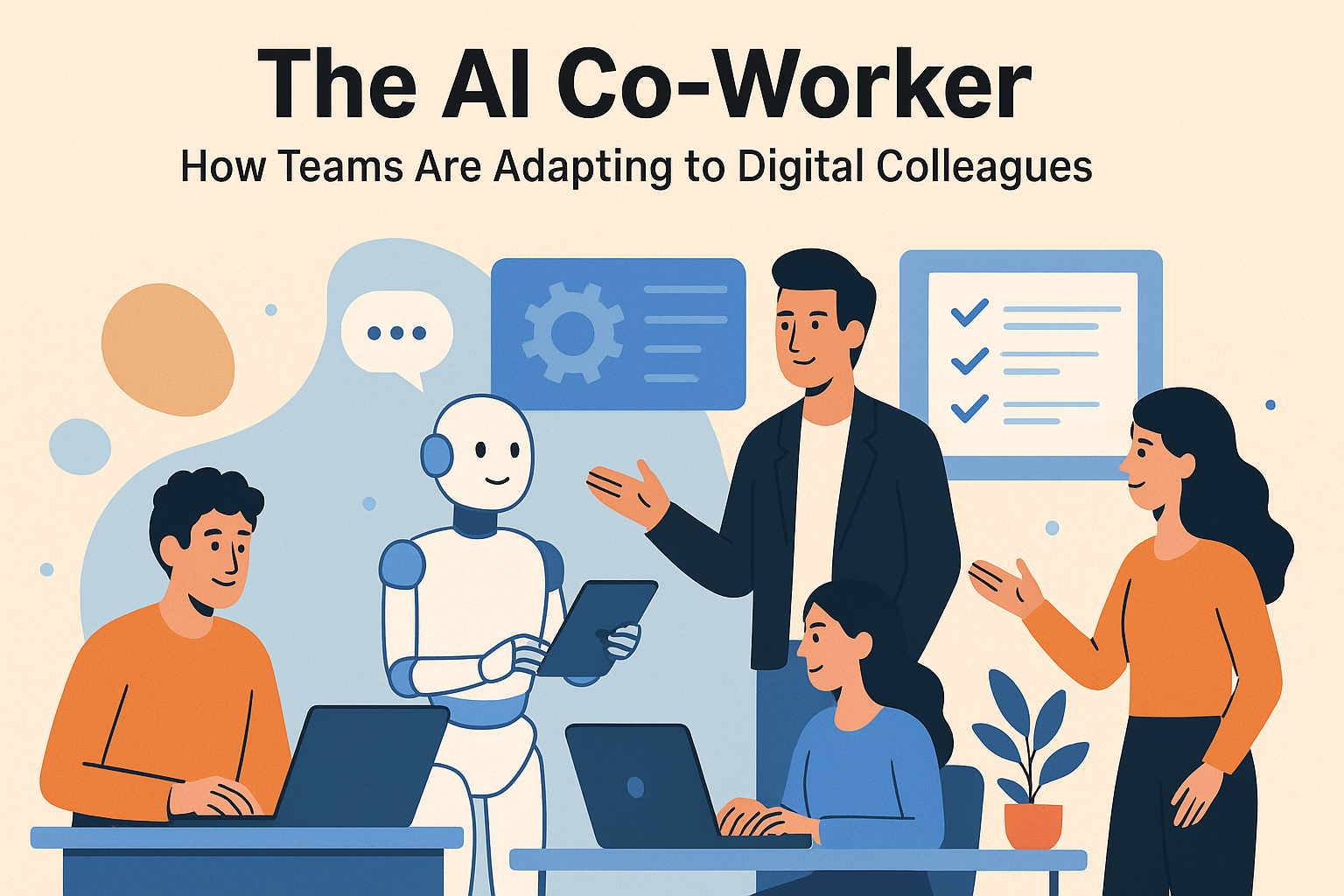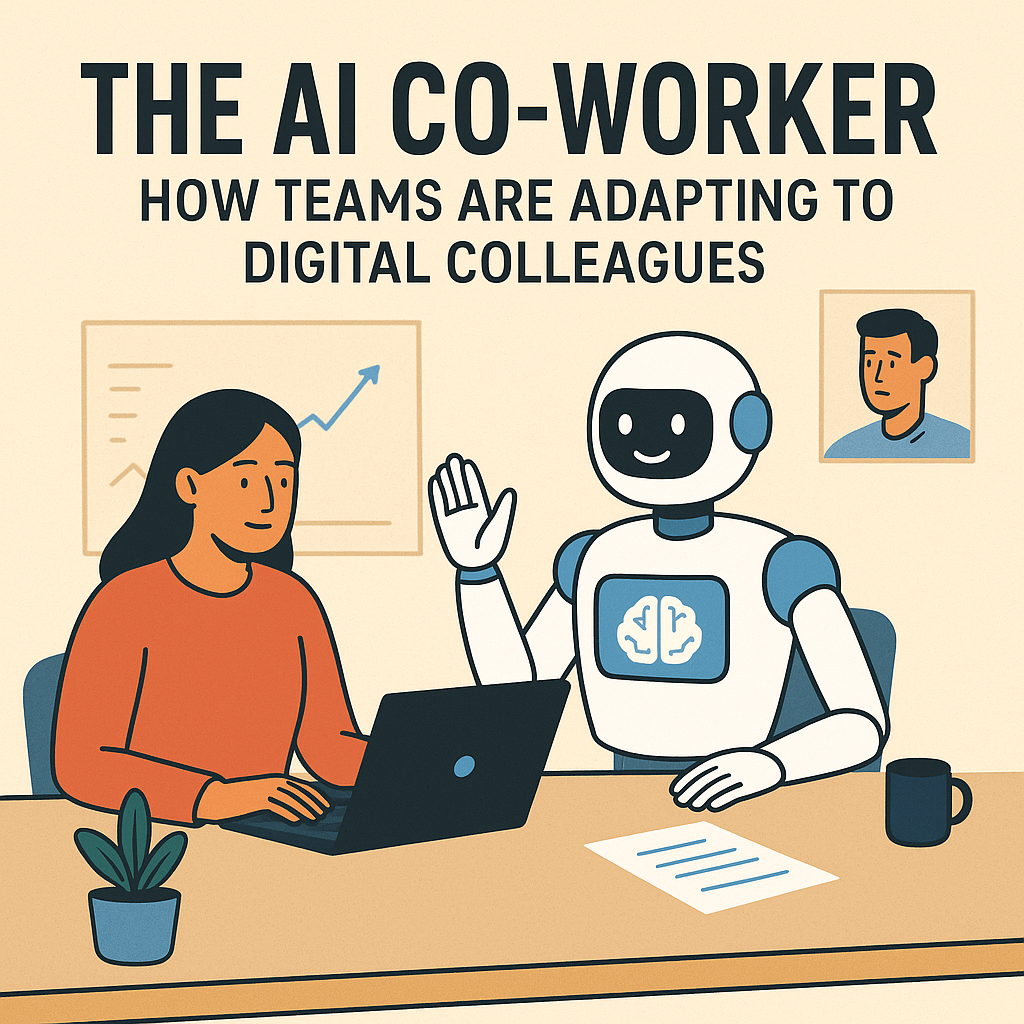The AI Co-Worker — How Teams Are Adapting to Digital Colleagues
Introduction
Workplaces are evolving quickly - and rather than just being a tool, AI is becoming a colleague. From virtual assistants that attend meetings alongside you to AI platforms that manage your projects, digital colleagues are slowly transforming our work lives. Teams are learning to collaborate, communicate, and even build trust with their new colleagues. It is a thrilling, and sometimes unnerving, transformation of our work lives - one that will redefine what teamwork means in the modern, AI-fueled workplace.

From Tools to Teammates: The Evolution of AI in the Workplace
Not long ago, AI was a fancy calculator: something that could automate tasks, crunch data, and accelerate workflows. Today, AI has moved into a bigger, more supportive role as a digital teammate. AI helps with writing content, analyzing market trends, scheduling meetings, and communicating with teams, being a direct co-participant in collaboration. Teams can now brainstorm ideas with AI, rather than simply relying on it as a tool. AI can be thought of as a colleague: always ready to work on-demand, never tired, and learning from every project. This changes what teamwork looks like, combining human creativity with machine productivity. While some are still resistant to trusting AI as a human collaborator, there is a growing number of professionals recognizing that, when applied appropriately, AI can improve outputs for all. The future of work is not just man or machine, but man and machine, working together to achieve greater aggregate work than ever before.
Combining Human Intuition and Machine Precision
The exciting aspect is when machine precision and human intuition converge. AI is exceptional at sifting through an enormous amount of data and finding patterns that a human may take hours (or days) to find. Meanwhile humans can show empathy, reveal stories, and layer in emotions, which no algorithm can replicate. That partnership is putting together smarter and more robust teams. An example is in marketing. Marketing teams are using AI to anticipate customer behavior, and humans are writing a story that appeals to their emotions. In medicine, AI is picking up on early signs of disease, while humans are interpreting those results with compassion and experience. It’s not about competing; it’s about picking up where each of us leave off. The teams that learn this balance through patience and perseverance are succeeding because they understand when human judgment is most valuable and when AI can take the wheel. The future will go to those who succeed in this amalgamation of creative insight (human) and analytical intelligence (machines) to yield results that are efficient and human.

Rethinking Roles and Workflows in the Hybrid Team
As AI becomes more embedded in all of our work processes, traditional roles are being rethought. In using AI to conduct repetitive tasks that involve a lot of data, people can refocus their energy towards strategy and creativity and to enhance human connection. This shift isn’t about job loss; it’s about the evolution of jobs. A marketer may end up spending less time managing and analyzing metrics and data and more time developing brand stories. A project manager may spend less time managing a timeline and more time ensuring they are motivating their team, using AI to manage the calendar. Work is changing as well, where meetings will include an AI assistant managing and summarizing conversations and the decision-making process will increasingly rely on the support of data. Similarly, professionals are developing new skills such as prompt engineering, and interpreting data, or to collaborate digitally. The essence of this adaptation is flexibility. Knowing when to rely on AI and knowing when to rely on human judgment is key. The future of work may not separate tech and people; it will blend both elements together as an integrated hybrid team that works together towards the same objectives.
Trust, Transparency, and the Morality of Working with AI
As AI becomes a collaborative “team member,” the need for trust emerges as an issue. Are we comfortable trusting a machine to make judgments that are fair and unbiased? Do employees feel secure in environments where AI is monitoring performance or managing sensitive data? These questions are driving the ethics of contemporary teamwork. Establishing trust begins with transparency — we should be able to explain how an AI system works, the kinds of data it uses, and what limitations it may have. Companies that are able to communicate this information clearly will be able to create environments where employees will work confidently, healthier, and more effectively. Additionally, ethical AI includes accountability, meaning that humans remain responsible for judgments — even when algorithms offer suggestions. Some organizations have now created “AI ethics officers” or principles to ensure fairness in the use of AI and avoid the escalation of bad consequences. The most successful teams see AI as a partner in the pursuit of integrity rather than a replacement for human conscience. Ultimately, the basis of any collaboration, whether human or digital, is trust. And it will be earning that trust that creates the next chapter of innovation in the workplace.
Conclusion
With AI integrating into our daily workflow, it is reforming how we do our jobs, how we collaborate and how we think. Teams that start to understand AI as a true partner, and not as a threat, are finding new ways to create and improve their efficiency. The future of work will not be humans versus machines, but the two working in tandem. Success in this new era, will come to those who can adapt, trust and develop alongside their digital teammates.
